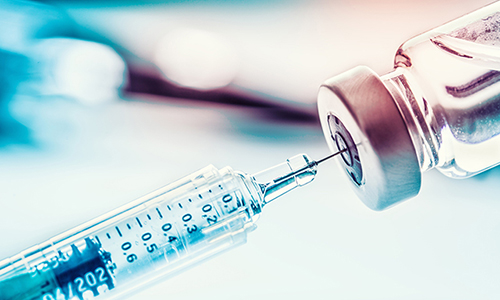Coronavirus, the COVID-19 Vaccine and Epilepsy: What You Need to Know
Featured Experts:
If you or someone you care for has epilepsy, you might be wondering about specific risks associated with coronavirus infection and the COVID-19 vaccines. Khalil Husari, M.D., a neurologist with the Johns Hopkins Epilepsy Center, and neurologist and epilepsy fellow Jay Bronder, M.D., explain what you need to know about epilepsy and COVID-19, the coronavirus vaccine, and special considerations and precautions for those who live with epilepsy and seizure disorders.
COVID-19 and People with Epilepsy
Are people with epilepsy more likely to get COVID-19 or have complications?
“No, having epilepsy alone does not increase your risk of coronavirus infection, severity, long-term COVID-19 or complications,” says Husari.
However, he stresses that seizure disorders can coexist with other health problems. A weakened immune system or other conditions such as lung disease, obesity, advanced age, diabetes and heart disease can put people at increased risk for coronavirus infection and more severe cases of COVID-19. Some people with these risk factors experience seizures as well.
Can epileptic seizures worsen during or after coronavirus infection?
“Although considered a rare event, high fever and infections can lower the seizure threshold, causing an increase in the seizure frequency,” says Husari. “This usually occurs in a small subset of patients.”
Is the COVID-19 vaccine safe for people with epilepsy?
Yes, based on information currently available, the COVID-19 vaccine is safe for people with epilepsy, says Husari. Although the data are limited, he explains, so far there is no evidence that patients with epilepsy are at a higher risk of adverse complications after getting the COVID-19 vaccine.
Seizure Medications and COVID-19
Do seizure medicines increase the risk of getting COVID-19?
No, seizure medicines do not increase the risk of getting COVID-19. Husari says there is no evidence that taking anti-seizure drugs increases your risk for becoming infected with the coronavirus.
Can COVID-19 treatments interfere with anti-seizure medications?
In general, no, COVID-19 treatments do not interact with anti-seizure medications, but it may depend on what the patient is taking. Husari says some of the older generation anti-seizure drugs (such as phenytoin, valproate, carbamazepine or phenobarbital) have a higher risk of potential drug-to-drug interactions with some of the medications used in patients with moderate to severe cases of COVID-19.
Patients with epilepsy who are being treated for COVID-19 should make sure their doctors know all the medications they are taking so they can avoid possibly harmful interactions.
COVID-19 and Seizures
Can COVID-19 cause seizures in people who do not have epilepsy?
“This is a very good and tough question to answer right now,” says Husari. “A large proportion of patients with moderate and severe cases of COVID-19 suffer from confusion and delirium.”
He adds that in rare cases, people who are sick with COVID-19 can experience seizures without obvious physical signs and convulsions (subclinical seizures. These seizures may show up as abnormal brain activity patterns on an electroencephalogram (EEG).
“It remains unclear whether these patients will develop recurrent, unprovoked seizures (i.e., epilepsy) once they recover from the acute illness,” he says. “Acute seizures can be a sign of the robust systemic infection and inflammation occurring in patients with severe COVID-19.”
Learn more about how COVID-19 can affect the brain.
COVID-19 Precautions for People with Epilepsy
What special coronavirus precautions should someone take if they have epilepsy?
“If you or your loved one has seizures triggered by fever, please discuss this with your epileptologist and come up with a seizure action plan that includes consideration of rescue therapies,” Bronder says.
Patients should also ensure they have an adequate supply of their medications — at least two weeks’ worth — in case they need to quarantine or isolate after coronavirus exposure or infection.
What should I do if seizures change or become more frequent during the COVID-19 pandemic?
Whether you need a minor medication adjustment or urgent care, you should not wait to see your doctor.
“Patients with epilepsy should not delay care,” Husari advises. “Following up regularly with your epileptologist or neurologist is essential, even during the coronavirus pandemic, since interruption of care can have a detrimental effect and increase the risk of worsening seizures.”
Your doctor has many COVID-19 safeguards in place to protect you from infection when you come to the office. Husari notes that many specialists on his team at Johns Hopkins’ Epilepsy Center and elsewhere are offering telemedicine alternatives to in-person appointments for their returning patients.
COVID-19 Vaccine








